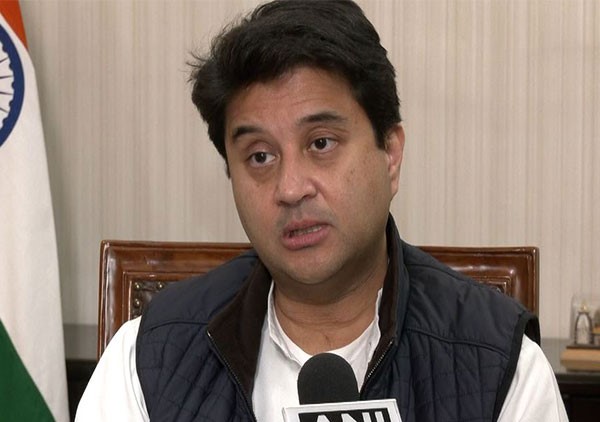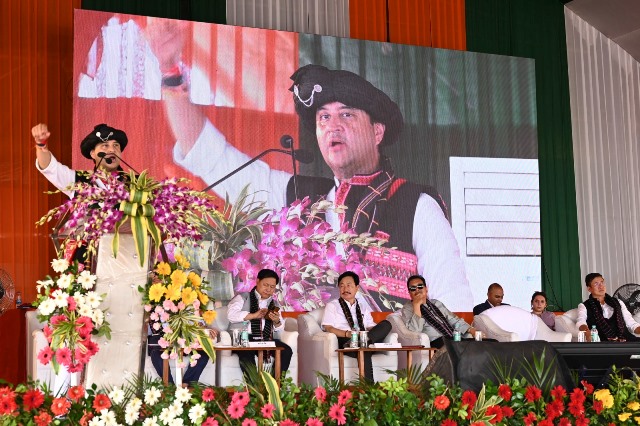India’s doors are open for whoever would like to come in and operate the satellite broadband service in the country by conforming to the regulations and requirements of the Indian government, Union Communications Minister Jyotiraditya Scindia has said, noting that the government has allowed satellite technology to be permeated within the country.
In an interview with ANI, Scindia said that spectrum for sattelite communication services will be assigned administratively at a price which is not determined by this ministry.
Answering a query concerning Elon-Musk-owned satellite internet company Starlink’s keenness to enter the Indian market, Scindia said “it is open for everyone”.
“Technology is ever-moving and ever-changing. Technology is extremely dynamic and more so in the decade we are living in and I think that it’s very important that India remains ahead and always ahead of the technology curve. Keeping that in mind, today satellite technology for mobile communication is being promulgated across the world. It’s a very complimentary technology to other forms of technology, be it terrestrial in the form of OFC cable or mobile towers or otherwise. And in India, we have very clearly followed the route that the rest of the world has followed which is to allow satellite technology to be permeated within our country,” the Union Minister said.
He was responding to a query about satellite communication increasingly becoming a buzzword.
Scindia said that last year in the Telecommunications Act, the awarding of spectrum on an administrative basis had been passed by Parliament.
“It is also from an engineering point of view and a scientific point of view not possible to auction the level of spectrum that is used in satellites which is not dedicated to a single corporation or single entity but is shared among various entities because when you have 6000 satellites, for example, on a Medium Earth Orbit (MEO) and Low Earth Orbit (LEO) orbit, that spectrum is shared by a number of players. And therefore, that spectrum will be assigned administratively,” he said.
“Firstly, every party, be it anyone will have to apply for a license, provided they conform to all the regulations and requirements of the Indian government. They certainly will be awarded a license. Post obtaining a license, they also have to get space approval from our organization, which is IN-SPACe (the Indian National Space Promotion and Authorisation Centre) because that allows for the orbital capacity of that entity’s satellites to orbit the Earth. And finally, following the first two prerequisites, spectrum will be assigned administratively at a price which is not determined by this ministry, but will be determined by the Telecom Regulatory Authority of India (TRAI),” he added.
The minister said TRAI is in the process of determining what that price will be.
“And at that TRAI-determined price finally, then the spectrum will be awarded to all the licensees who want to enter the space. Today as we speak two parties have already obtained that license Reliance, and Airtel through OneWeb. There are a number of other prospective licensees and India’s doors are open for whoever would like to come in and operate the service in India,” he said.
Starlink’s entry into India has gained currency lately, with Donald Trump winning the US presidency. Musk is close to Trump and the former had openly campaigned and raised funds during the latter’s presidential run.
The government informed the Lok Sabha last month that Department of Telecommunications (DoT), as part of Satellite Communication Reforms-2022, permitted User Terminal stations on moving platforms for provisioning of satellite-based connectivity, subject to compliance with relevant Telecommunication Engineering Centre (TEC) standards and conditions mentioned by amendment in the Unified License issued in May that year.
Minister of State for Communications, Dr. Pemmasani Chandra Sekhar said in a written reply that the Satellite Communication Reforms-2022 facilitated ease-of-doing business, streamlined a number of processes including implementation of “single scrutiny workflow” and rationalized various charges.
“The recent Space Sector reforms enable larger participation of non-government entities for building/leasing, owning and operating the satellite systems for providing satellite-based services. These reforms aim to enhance the accessibility and affordability of satellite-based services for citizens. DoT’s Satellite Communication Reforms-2022 have simplified the regulatory procedures and reduced financial charges on the licensees,” he said.
“As a result of the recent Space Sector reforms, many satellite operators have shown interest and applied for authorization for providing the satellite communication over India. It is envisaged that with more players, enhanced satellite capacity would be available and competition in this segment will lead to better quality and affordable services, along with expansion of coverage in rural and far-flung areas,” Pemmasani Chandra Sekhar added. (ANI)

